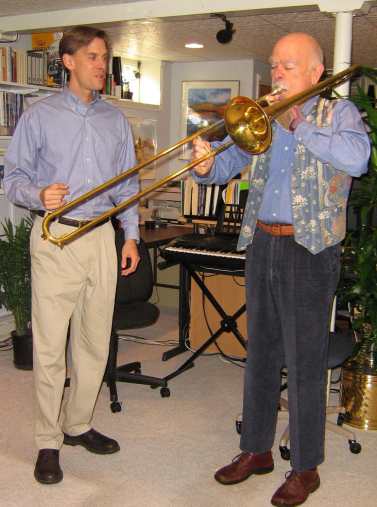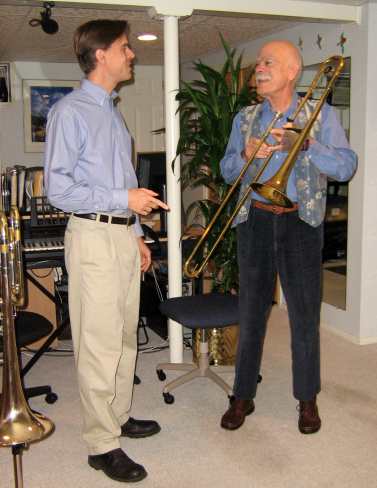Lessons For Adult Avocational Players

"Whether with analogy, detailed explanation, or example, Brian has always been able to help me through any problem spots in my playing."
- Brian Hutzell - musician and artist
"Brian Kay is a creative and effective instructor. Teaching me to play trombone has been a challenge since I am an adult learner. Brian structures each lesson in a sequential learning pattern so that I can see improvement from lesson to lesson. He develops strategies that address my weak areas. He provides tools I can use to practice on my own. I strongly recommend Brian Kay for a beginner like myself. Even though he is an accomplished musician, he has the insight and expertise of a sensitive educator. He develops many of his own books and charts and is especially strong in assessing my needs. As (a non-music) educator, I understand the traits of a skillful teacher, and Brian Kay is an A plus."
- Barbara - Art instructor and adult trombone student
Instruments Taught
- Trombone
- Bass Trombone
- Tuba
- Euphonium (Baritone)
- Beginning and Intermediate Trumpet
- Beginning Horn

Teaching Philosophy for Adult Students
I have had the privilege of teaching a number of adult players over the years, from absolute beginners to semi-professional players. Students of every age deserve an enthusiastic guide who can answer their questions, guide them along productive paths, and provide feedback and encouragement.
There are several challenges of teaching adult avocational players which I enjoy. One is coming to terms with the uniqueness of each player. Every student is unique, but adults have gone further down their own unique paths than school aged students, so the challenge of assessing a student's needs, strengths, and weaknesses becomes richer. Some adult students have weak areas, or bad habits that have become entrenched, and I enjoy blasting away (in a positive sense) at these areas using teaching tools and sharing playing and learning techniques that I know to be effective.
Many of my adult students have felt embarrassed about weak areas, or felt they should be able to practice more, which is understandable, but my attitude is one of respect for their being willing to take on the challenge and appreciation that they have come to me for help in music.
Musicianship Diagnostic
I have developed a comprehensive set of assessment tools for use with new students. These checklists and graded playing and rhythm exercises allow me to efficiently and thoroughly identify a new student’s strengths and weaknesses in a manner that is enjoyable to the student.
The Learning Process
I believe in progressing from the simple to the complex. Wherever a player might be along the continuum of a specific skill, we start with something the player can do and move towards what we would like them to be able to do. As a teacher, prioritizing what I have to say, and focusing on the most important first is key. The simpler the instructions, the better. About 60% of the lesson time should be spent with the student playing.
Lesson Structure
- Conversation
Its important to spend a little time at the start of lessons in conversation, to catch up, and get comfortable. - Warm-ups and Basic Skill Building
I believe in a succinct warm-up that gets a player ready to play, and provides a framework for working on fundamentals of breathing and tone production, tonguing, flexibility (slurring), and range. I use a lot of demonstration and imitation in this part of the lesson. - Assigned Material
The burden now shifts to the student to demonstrate what they have learned since the last lesson. Questions are discussed and confusing topics explained as clearly as possible. Feedback is given and any achievements are celebrated. The process of practicing is explored as needed. - Goal Setting
We pick specific, doable goals together for the next lesson. As time allows we "preview" new music to get the ball rolling and clear up any misconceptions at the outset.
- Model for Practice
The lesson becomes a model for the player's own practice sessions. The content of the lessons establishes what the student should be practicing at home, and the standard of quality and effort set in the lesson becomes the target ideal for the student.
Communication
If a private student doesn't understand what I have told them, then I need to find a different way of explaining it that connects - a challenge I enjoy.
Please contact me if you have any questions or would like to book an individual or regular weekly lessons. Lessons are available either at my home studio, or through New England Conservatory Continuing Education Division.
Here are some links to pages on this site that will help you get a good sense of what my teaching is like.
- Biography
- Student Success Stories
- Books that have influenced my teaching
- Audio Sound files - hear recordings of my students
- My Top Ten Tips for Teaching Trombone
- See Handouts I
have developed for my teaching
If you have other questions about my teaching, please feel free to email me.
